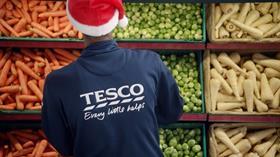
British supermarkets racked up a record £29.3 billion sales over the Christmas period, despite a supermarket slowdown in growth on last year’s festive season.
In the 12 weeks prior to Christmas, shoppers spent £450 million more than in 2017, with discounters Aldi and Lidl making further gains, achieving their highest-ever combined market share of 12.8 per cent, according to Kantar Worldpanel data.
With the supermarket sector currently going through a period of low growth at 1.6 per cent, its lowest since March 2017, households registered £383 in grocery bills in December.
Saturday 22 December was the busiest shopping day of the year, as more than half of households made a last minute Christmas dash, with 1.7 million additional customers hitting the stores compared to the previous Saturday.
The slower inflation rate helped shoppers to manage budgets over the festive period, demonstrated by 60 per cent of them choosing shopping habits that made their money go further.
Premium own-label lines increased by 3.7 per cent over the 12 week period, which, though half of last year's increase, still saw record-breaking sales of £1.1bn.
Frazer McKevitt, head of retail and consumer insight, at Kantar said: “Although the grocers achieved record sales, overall spend was actually tempered by lower inflation of 1.3 per cent – that’s less than half the level of like-for-like inflation of 3.6 per cent which was recorded in Christmas 2017.
“This slower inflation rate helped shoppers to manage their festive budgets, with 60 per cent of customers looking to make savvier decisions to make their money go further over the holidays.”
Marketing efforts by Aldi proved successful for vegetables sales with an increase of 18 per cent in carrot sales helped by the return of ‘Kevin the carrot’. One in five bought vegetables at Aldi, as the discounter narrowly achieved the crown for fastest growth.
Tesco gained an extra 125,000 customers, mostly in their larger stores, which contributed to 0.6 per cent growth. Tesco was the only supermarket to increase promotional activities year on year, with discounts including a 29p pricing strategy on vegetables. Tesco’s market share stands at 27.8 per cent, down by 0.3 per cent from last year.
Sainsbury’s and Morrisons' market share fell by 0.3 per cent and 0.2 per cent respectively. Sainsbury’s had a 0.4 per cent decline in sales whereas Morrisons had a 0.1 per cent increase. Waitrose sales were down 1.7 per cent and currently has 5 per cent of the market share.
Iceland currently holds 2.3 per cent of the market share, a slight increase of 0.1 per cent from last year, with four fifths of the growth coming from non-frozen groceries - thought to be a result of continued changing consumer perceptions.
The shift to online shopping has affected the grocery market less than high street shops. Despite ecommerce being up 3.9 per cent compared to the same time last year, it is failing to attract new customers – existing customers are just seen to be spending more.
McKevitt added: “Though not included in our till roll data set, Amazon remains one to watch as its FMCG sales jumped by 16 per cent over the 12-week period.”



